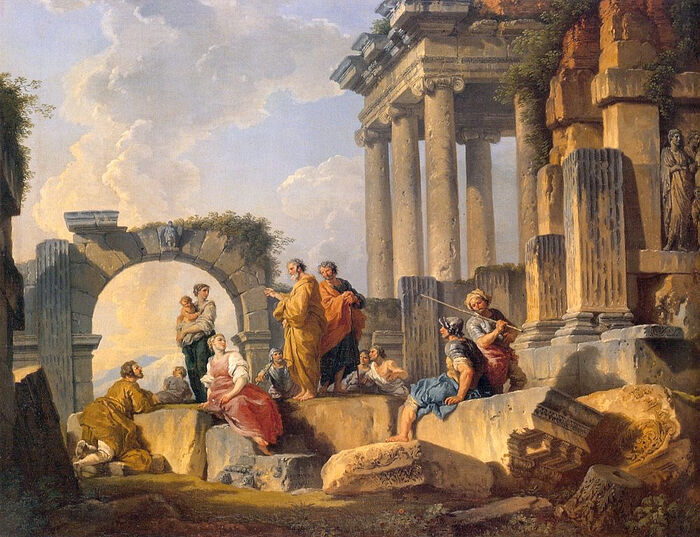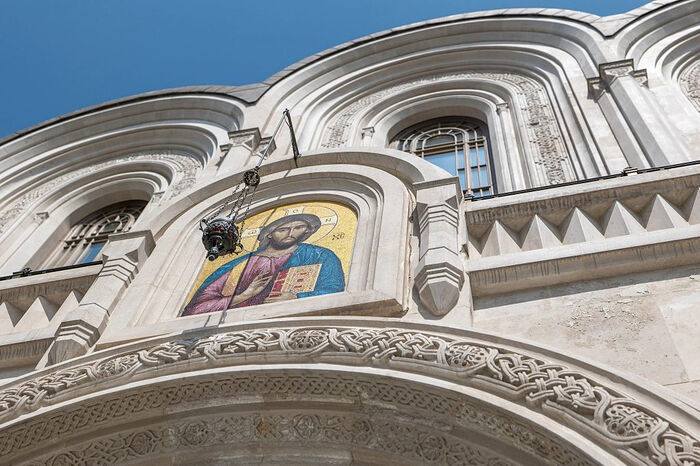We continue our talks on the Book of Acts with Sergei Komarov, a well-known catechist based in Moscow.
Today we’re looking at the fourth chapter. I remind you that the third chapter talks about how Sts. Peter and John went to the Temple together to pray and healed the man who was lame from birth. St. Peter then preached a sermon on this occasion. By the way, we read here: “Peter said to the people…” And what was St. John doing at this time? Was he standing nearby silently? Or maybe he said something too? Most likely, the phrase, “Peter said to the people,” means that St. Peter, as the leader of the community, was the initiator of the preaching, the ideological inspiration. Perhaps he started it, but we can assume that St. John also said something there. It’s just that St. Luke unites all these words in the person of St. Peter, as though it was St. Peter saying them. But we don’t know for sure. But it really does raise the question of what St. John was doing during St. Peter’s first and second sermons. We’re going to talk about the second sermon now. On the other hand, as the younger one, maybe he really did keep quiet while the elder spoke. So there are a few possibilities here.
Today we’re going to read about how Sts. Peter and John were arrested. This is the first time the Apostles were arrested for preaching the Gospel—how they preached in the Sanhedrin, and how they were released. And we’ll talk about the first prayer of the Christian community. It’s a very interesting chapter.
So, let’s begin the fourth chapter.
4:1 And as they spake unto the people, the priests, and the captain of the Temple, and the Sadducees, came upon them,
4:2 Being grieved that they taught the people, and preached through Jesus the resurrection from the dead.
Let’s stop here.
Who was it that came up to them? Who initiated the arrest of the Apostles? The priests, the captain of the Temple guards, and the Sadducees. Such an interesting group. It’s not the High Priest and his servants. It’s like the middle stratum: priests, the head of the Temple guards, and the Sadducees. It’s understandable why the Sadducees came, because the Apostles preached Christ’s Resurrection from the dead, and the Sadducees were against the resurrection of the dead in principle; so this topic was painful for them.
Moreover, we remember that the Sadducees were the Temple clerics; that is, they were responsible for the order in the Temple, and in general, they were interested in only one thing—that everything would be calm and quiet, that nothing bad would happen. And when such unrest suddenly begins amidst the people, when some new religious society appears, they’re alarmed about it; it’s not what they need. And here it’s noted in 4:2 that they were preaching Jesus’ Resurrection from the dead, which the Sadducees didn’t like at all.
And then they laid hands on them (4:3). This is a Biblical expression, a sign of violence, arrest, or something along those lines. And put them in hold unto the next day… Why until the morning? Because it was forbidden to judge in the evening. Remember that one of the Jewish laws that was broken by the High Priests and Scribes at the judgment of Christ was that they judged Him at night. Here they’re supposedly acting according to the rules, so they hold them until the morning, for it was now eventide.
4:4 Howbeit many of them which heard the word believed; and the number of the men was about five thousand.
Such constructions are repeated often in the book of Acts, that people were added—there three thousand, here five thousand. We see how the Gospel message is spreading and the number of believers in the Church is constantly growing, like a dough rising.
4:5 And it came to pass on the morrow, that their rulers, and elders, and scribes,
4:6 And Annas the High Priest, and Caiaphas, and John, and Alexander, and as many as were of the kindred of the High Priest, were gathered together at Jerusalem.
We remember the situation in the time of Christ. The High Priest should generally serve for his entire life. It’s like our Patriarch. The Patriarch can’t be changed. Once elected Patriarch, it’s to the end of his life—and it was the same with the High Priest. But the High Priests are called both Annas and Caiaphas. So, who then is the High Priest—Annas or Caiaphas? Caiaphas, according to the Gospel. And Annas is probably an abbreviation of the name Ananias—his relative, his father-in-law. Caiaphas was Annas’ father-in-law.
Apparently this was a “package deal.” First one man was High Priest, then another was put in place while the other was still alive, thanks to cooperation with the Roman authorities. It was a violation, but that’s probably how it was then. Therefore, first this one is called High Priest, then another, and this is why the words “High Priest” can appear in the plural, although it’s absurd. It’s like saying, “Patriarchs.” We can only have one at a time. It’s the same here.
Presumably John and Alexander are simply the children of Caiaphas. One of the historians even names the children of Caiaphas as John and Alexander. I think Josephus wrote that John and Alexander later became High Priests after Caiaphas. And Annas was involved in this too, and others from the family of the High Priest. That is, it’s a bearded mafia. Yes, clerics. It’s entire families of clergy occupying everything, and judging everyone all together.
4:7 And when they had set them in the midst, they asked…
Yes, they put them in the middle. Historians write that this is how the Sanhedrin held its sessions: the Sanhedrin in a semicircle, with the accused in the center. And then, when they had set them in the midst, they asked, By what power, or by what name, have ye done this? Again a conversation about names. By whose name did you work this miracle? It’s referring to the source of supernatural power. Tell me, where is he from? And also, by what power was this done? It’s a provocative question, suggesting some kind of magical practices. Indeed, it would be a strong accusation if the Apostles could be suspected of some kind of witchcraft—then the Jews themselves would have stoned them. By the way, if you’ve read the lives of the ancient martyrs, recall how they often tried to present them as sorcerers. They healed someone, or, let’s say, a martyr was tortured, and when they came in the morning, he was completely unharmed. “See? He’s a sorcerer,” they’d say. It happened quite often. And here, by what power, in what name did you do this? This is a typical Jewish expression.
4:8 Then Peter, filled with the Holy Spirit, said unto them, Ye rulers of the people, and elders of Israel,
4:9 If we this day be examined of the good deed done to the impotent man, by what means he is made whole;
4:10 Be it known unto you all, and to all the people of Israel, that by the name of Jesus Christ of Nazareth, Whom ye crucified, Whom God raised from the dead, even by Him doth this man stand here before you whole.
In fact, St. Peter repeats the sermon he preached the day before for the regular people. Yes, by the name of Jesus Christ of Nazareth. Everything is repeated, or rather, the main idea is conveyed here in an abbreviated sermon.
And now something new appears, namely the image of a stone.
4:11 This is the stone which was set at nought of you builders, which is become the head of the corner.
This is a quote from Psalm 117. In the Gospels, Christ Himself also recalls this place, saying that He’s that stone that is become the head of the corner (Mt. 21:42). The builders put the stone at the head of the corner, around which everything else was built. They had this principle of construction. In the same place, Christ says that whosoever shall fall on this stone shall be broken: but on whomsoever it shall fall, it will grind him to powder (Mt. 21:44).
But having become the head of the corner, neither is there salvation in any other: for there is none other name under Heaven given among men, whereby we must be saved (Acts 4:12).
We have here for the first time the word “salvation;” “be saved.” That is, Christianity will be salvation. Perhaps the Apostle Peter is making a play on the name of the Lord Jesus Christ here. Pay attention to this name. This is what they called the Lord Jesus Christ, as He was addressed in Aramaic. The diminutive form of Jesus is Yeshua, and if we take the full version—it’s Yehoshua. Don’t these first three letters remind you of anything? The Tetragrammaton. Yes, there’s a designation of the name of God in the Old Testament—yodh-he-waw-he. We don’t know today how it was pronounced—these four letters—because they’re all consonants, read from right to left. The ancient Hebrew alphabet consists of consonants, while vowels were as if guessed by the reader while reading.
By the way, in antiquity you needed much knowledge in order to read. You had to interpret these letter combinations on the fly, to build the right words, to pronounce them correctly—that is, to come up with the vowels. And now the question arises of how this yodh-he-waw-he was vocalized? If you open the modern Hebrew Bible, with vowel marks, you’ll see there the vowel marking from another word—the word Adonai, because Jews replaced the sacred Tetragrammaton with the word Adonai (Lord). The Tetragrammaton isn’t allowed to be pronounced. Not only does no one know how it’s pronounced, but it’s also forbidden to pronounce it, because it’s a sacred thing, and there’s a specific meaning here. And when they come across the sacred Tetragrammaton when they’re reading Scripture in the synagogue, they say Adonai. They simply change it. And the vowel markings for this word are taken from the word Adonai. When our Synodal translators translated this text in the nineteenth century, they read it like “Jehovah.” But that’s incorrect. According to the rules of Hebrew grammar, it’s impossible to read this word this way.
Most likely, yodh-he-waw-he is read as “Yahweh.” Why am I saying all this? First, the name Jesus includes the Tetragrammaton, or at least the first three letters—yodh, he, and waw. The name “Yehoshua” means “salvation.” Or, to translate it more accurately: “Yahweh saves.” The name Jesus was a common name. It stands for action. We know that when the angel announced the birth of Christ, he said that His name would be Emmanuel. So the question arises why He wasn’t named Emmanuel, but Jesus. Because Emmanuel means “God with us,” that is, the name indicates an event. It’s a common name; it occurs often in the Bible.
This is why I’m saying all of this. When we read in St. Peter’s sermon that there is none other name under Heaven given among men, whereby we must be saved (Acts 4:12). Perhaps it’s a variation on the name Yehoshua—salvation, to be saved, the path to salvation. That is, Christ is salvation, in action. Yes, this name is an event—Jesus. And Christ—we know how it’s translated. “Anointed.” That is, in fact, Jesus Christ is called “Jesus the Anointed.”
There are still disputes about where Biblical Hebrew itself comes from. It’s believed it’s the Phoenician alphabet, converted by the Jews. Although others believe the influence of Egyptian hieroglyphs can be detected in it. Basically, everything’s lost to the sands of time, and we don’t know how it all really happened. Perhaps it was just the Sinaite alphabet in which Moses wrote the commandments of God. And perhaps this Sinaite alphabet was born earlier than the Phoenician alphabet. We don’t know for sure. You can find many articles about this online.
For there is none other name under Heaven given among men, whereby we must be saved (Acts 4:12). Such evangelical radicalism we’re seeing here. It’s only through the Lord Jesus Christ that we can be saved. Many could be outraged by this today. Indeed, we often hear: “God is one, but there are many paths to Him. All religions are right in their own way, and they’re all good, all are great.” But in fact, the Bible is an extreme book in this regard. Here it says: Neither is there salvation in any other: for there is none other name under Heaven given among men, whereby we must be saved. That is, it’s only through the Son that we can come to know the Father. This is a Biblical word.
The words “be saved” first appear here. I wonder how the Jews who were listening to St. Peter understood him. We know about this today, and we understand that the word “salvation” has two aspects: what Christ saves us from and what He saves us for. By the way, how would you answer these two questions: What does Christ save us from? From death, from sin, from the devil. What else? From corruption. That is, from all the consequences of the Fall: from death, the devil, and sin. And for what? For eternal life, for theosis. The Apostle Peter talks about this: how to become partakers of the Divine nature. This is the purpose of the Christian life, what theologians call “theosis.”
To be continued…




